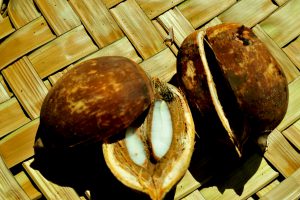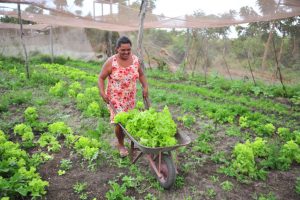FIXED PROJECTS | RELOCATION OF FAMILIES | INCENTIVIZED PROJECTS
Permanent Projects
Eneva works to be recognized as an agent for transforming society, developing social initiatives (compulsory and voluntary) with the aim of strengthening the skills of communities, promoting their role and autonomy.
Our commitment to foster sustainable local development in the regions where we operate is carried out through the adoption and dissemination of management and governance practices in the territory that incorporate social, environmental, economic and cultural aspects, always in partnership with interested parties.
Get to know our fronts:
Sustainable Education
Eneva develops sustainable educational programs in the city where it operates, sharing information about its ventures, the environment, agriculture, healthy eating practices and themes that promote conversation on social empowerment.
The program was crafted on the molds of the National Environmental Education Policy (PNEA), and the major characteristic is the collective debate among those involved in spreading socio-environmental information.
Actions Carried Out:
- Training and certification of over 400 Community Health agents;
- Planting school vegetable gardens for practical classes, supporting multidisciplinary learning and integration of about 2,500 children from the area where we work;
- Training seminaries to encourage social projects;
- Educational actions in 51 communities in our direct area of influence;
- Workshops on healthy eating and reutilization of foodstuffs, with about 350 attendants.
Social Enterprisel
We believe that communities have to take on the responsibility of pro-activism and independence through access to knowledge and opportunities for development. With the Social Enterprise Certification Program, Eneva has already trained over 350 teenagers and young adults who took part in specific courses on the methods and theories of social enterprise in order to develop projects that can transform the reality of their own community.
At the end of the course, a panel made up of representatives from the public authorities, Eneva and professional experts evaluated the projects created during the course and guide the participants on how to get turn their theory into practice.
Generation of Wealth and Income
Eneva supports projects which allow communities that are located in our area of influence to generate wealth and income. The projects take into consideration the characteristics of each region, encouraging the potential that already exists in each community.
Supported projects:
The Association of Women Babaçu Nut Crackers
The Association of Women Babaçu Nut Crackers project is situated in the city of Capinzal do Norte (MA), in the area surrounding the Parnaiba Complex. The main objective is to strengthen the traditional community of Babaçu nut crackers in the region, reinforcing and empowering local leadership with the training of hand labor. Almost 200 Babaçu nut crackers work with this ‘fruit of the earth’ and have started working as nut collectors.
Main activities developed:
- Collecting Babaçu nuts.
- Breaking the fruit.
- Using the husk and the nut commercially.
- Manufacturing soap and homemade soap powders.
- Production of homemade olive oil and Charcoal.
- Local crafts.

Productive Backyard Project
The Productive Backyard Project was developed together with the residents of Quilombos São Francisco and Bom Jesus, in the municipality of Lima Campos, in the heart of Maranhão state. The project currently involves the participation of 140 families, promoting the increase in income generation through the development of agro-ecological practices like home vegetable gardens and the raising of chickens and pigs.
The HortCanãa Agricultural Nucleus Project
The HortCanãa Agricultural Nucleus Project was undertaken together with the resettlement of the city of Vila Nova Canãa, to promote the financial sustainability of the community, create jobs and income and develop its independence. Its 60 hectares of land that is used for agricultural production now boasts an infrastructure that includes shelters, greenhouses, automated irrigation, a milhouse, a sanitation house, kiosks, warehouses, offices and the Galinha Caipira Project (Free Range Chicken project)
This nucleus is the main source of income for these families resettled by Eneva in São Luis (MA). It is currently managed by the Association of Agriculturalists of Vila Nova Canãa.

